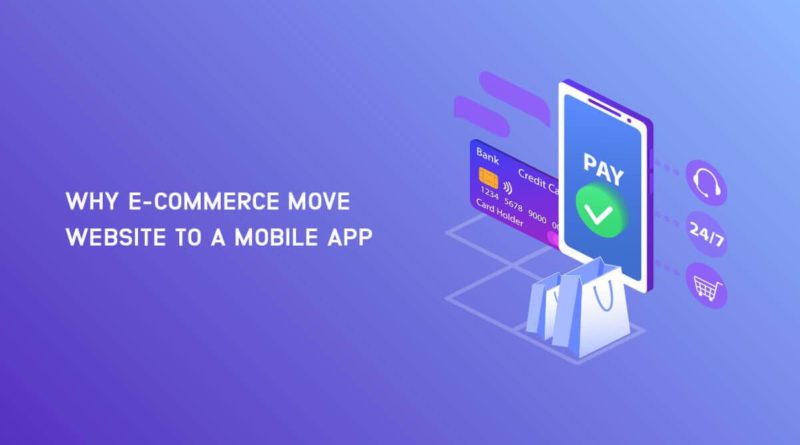Why E-commerce Website Convert to a Mobile App?
E-commerce or electronic commerce is the activity of buying and selling products via electronic means. This means that the distribution of goods and services is done through mobile apps, websites, social media, etc. Electronic commerce uses various modern technologies like mobile commerce, the electronic transfer of funds, management of supply chain, marketing via the Internet, processing of online transactions, electronic data interchange (EDI), inventory management systems, and so on.
In modern times electronic commerce mainly makes use of the World Wide Web for at least some of the transactions. However, it uses other technologies like e-mail.
Electronic commerce includes the sale of books, music, clothes, daily essentials to online liquor store services. It has seen a massive boom in the present day. Most of the transactions carried out today are through online means.
There are three main areas of e-commerce:
- Online Retailing
- Electronic Markets
- Online Auctions
It may also include services such as online shopping, online marketplaces, business to business buying and selling, gathering and the usage of demographic data collected through web contacts and social media sites, electronic data exchange within businesses, engagement in retail, online financial exchange, currency exchange and so on.
E-commerce trends has also changed the way that people shop. Before the emergence of online retail, people had to physically go to the shops and carry out their necessary tasks. This, in itself, wasted a lot of money. But with the emergence of E-commerce, people could now buy and sell products by pressing a button in the comfort of their homes. The emergence of online retail has lightened the hassle that was present previously and has proven itself to be a boon in people’s busy lives.
And not just convenience, online websites of products also offer a lot of good deals and promos that can make buying of goods cheaper for the customers. So all in all, the emergence of e-commerce has saved a lot of money and time and made shopping flexible and easy.
Why Has E-Commerce Moved To Mobile Applications?
The modern world has seen a growth of online distribution and selling of multiple products. In such a competitive environment, e-commerce has proven to be an intense battlefield. So many companies are coming up nowadays who want to see their products online. Be it big business houses or small startups.
Owing to such an ongoing battle and competition, e-commerce has now made the full usage of mobile applications. They have shifted their business to mobile devices.
A large number of businesses are using mobile apps. Mobile apps are being used for several purposes, and definitely, e-commerce has found a way to make the best use of the mobile application for generating sales.
For example, big retail companies like Amazon have launched their mobile applications that customers can access to buy and sell goods. A huge business establishment like Walmart is now venturing their services online. With mobile applications, shopping is redefined. We can agree with the fact that e-commerce and mobile apps go hand-in-hand.
And not just these, even movie chains and pet supply stores are connecting with their customers via their own branded apps. Clothing chains like Zumiez, which is a popular clothing retail chain in the USA, have their mobile application.
This shift of e-commerce to mobile applications can be a consequence of the massive growth in the usage of mobile devices like smartphones and tablets. This reason alone is giving a major boost to the e-commerce market. So much so, that nowadays it is being termed as m-commerce or mobile commerce market. And not just this, technology is advancing every day. This makes the entire business process quite easy to carry out on mobile and encourages the customers’ buying behavior. This factor also contributes to the growth of the m-commerce market.
According to sources, the global e-commerce market generated revenue equal to a total of $639 billion in 2019 from a total of $459.38 in 2018. Another study has stated that the global m-commerce market will grow at a CAGR of 27% during the forecast period of 2019-2024.
Almost everyone in the world today uses mobile devices like smartphones and tablets in their day-to-day life. What is better than to make full usage of this blooming opportunity? Major companies have realized that shifting their market to mobile applications will help to broaden their reach among their customers. Companies are taking the special initiative to build their apps that are available in both Android and Apple versions. These apps are available in the Google Play Store or the App Store of Apple. Customers can download mobile apps and carry out necessary transactions as per their whims. Companies employ app designers and builders to create unique and eye-catching apps for their brands.
The Benefits of Mobile Applications For Retailers
1. Increased Versatility
Mobile apps are far more responsive and have very little connectivity issues than the web. They can also incorporate various features like GPS, Bluetooth, address book, and camera for the scanning of credit cards and the product.
2. Meeting Cross Channel Customer Demands
Customers often demand an alternative mobile app from top retail brands. Mobile apps are also increasingly becoming the most preferred way of interacting with various brands among the majority of clients.
3. Personalization Of The Shopping Experience And Boosting Customer Loyalty
The foremost benefit of a mobile app is that it enhances customer engagement by sensing personalized notifications to consumers. This includes news, relevant information about the products being sold, and also promotions. There is also the facility of rich in-app messaging which has created a powerful interactive environment between customers and the retailer. It improves conversation engagement and revenue.
4. Gathering Of Meaningful Data
Having a mobile app also helps the retailer to track and understand customer behavior alongside engaging with the customers. Several retail-focused mobile analytics tools are available, which serves this purpose. They help the retailer to gather valuable information about a customer’s buying behaviors and every other aspect of a user’s interaction. This helps brands to make data-fuelled business decisions.
5. Facilitating Payments and Check-Out
Mobile apps also help in streamlining payments much more easily and efficiently. The check-out process is completed through banking applications, scanning of credit and debit cards, digital wallets, and much more. It is a safe and secure mode of payment, even for the consumer.
Studies have shown that up to 89% of users are using mobile retail apps rather than visiting mobile websites. An average of two-thirds of the total traffic to online stores is coming from mobile phones and tablets. This alone shows the dramatic change mobile applications have brought forth. Consumers have realized the importance of mobile applications.
Conclusion
The building of mobile apps is a very simple way of increasing sales, reinforcing the client base, and giving the brand a major boost in a competitive environment. Creating a mobile app for your online retail store can help you achieve this purpose. Today, mobile apps are taking over the market and also gaining many users. And not just this, along with increasing sales they are also responsible for the generation of considerable profits. And given the current situation, it is likely that mobile devices will soon topple over desktops as the main devices for online retail.
Jignesh Vaghasiya is the CEO at Universal Stream Solution. Universal Stream Solution is a Mobile App Development Company in Atlanta. That helps startups to enterprise companies in mobile web technology.




